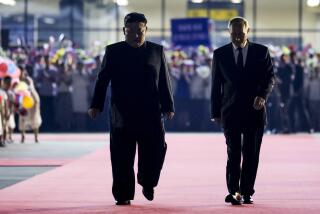The son also rises
- Share via
The top leadership of the Workers’ Party in North Korea meets once every 30 years whether it needs to or not. The congress that opened Tuesday is the party’s highest-level assembly since 1980, and seems to have been called to anoint a successor to “Dear Leader” Kim Jong Il — presumably his youngest son, Kim Jong Eun. The little Dear, who is twentysomething, was promoted just before the meeting to the military rank of four-star general, according to the country’s official news media, which also happen to be the only news media in Kim-controlled North Korea. And that’s about all we know of the events taking place in Pyongyang, in a global information age when far too much is communicated about things that don’t matter, while dangerously little is available on the nuclear Hermit Kingdom and its next-of-Kim.
This page is not enamored of family dynasties, and even less so when the heir to the dictatorship is an enigma. There are a couple of childhood photographs of Jung Eun, who reportedly studied in Switzerland, supposedly is temperamental, likes basketball and, according to the family’s former sushi chef, “never admits defeat.” Korea-watchers believe he wouldn’t make major changes in the way the government deals with the rest of the world, which is to say that he would maintain its adherence to juche, or self-reliance, through closed borders and a closed economy, and would continue its nuclear brinkmanship. Unless he feels the need to prove his mettle, in which case he could be even more bellicose than his father.
Or so it is said.
At the last party meeting, Kim Jong Il was declared the successor to his father, “Great Leader” Kim Il Sung. When he took the reins in 1994, skeptics said he’d never last. Now the same is said about the little Dear, whose aunt also was elevated to the rank of general this week, presumably so that she and her husband, who is vice chairman of the National Defense Commission, could serve as regents to the inexperienced next leader.
It is truly remarkable how little outsiders understand about this country of about 24 million people, who are as cut off from us as we are from them. China helps prop up the regime as a buffer between itself and the tens of thousands of U.S. troops in South Korea, and out of fear that the collapse of the Pyongyang government could send millions of refugees across their shared border. Asian markets also prefer stability over sudden change or, worse, unrest. The family dynasty mixes favors, ideology and ruthlessness to maintain its grip on power. North Koreans, meanwhile, suffer the regime’s economic and political repression in a country that offers little information even to its own people.
More to Read
Sign up for Essential California
The most important California stories and recommendations in your inbox every morning.
You may occasionally receive promotional content from the Los Angeles Times.










